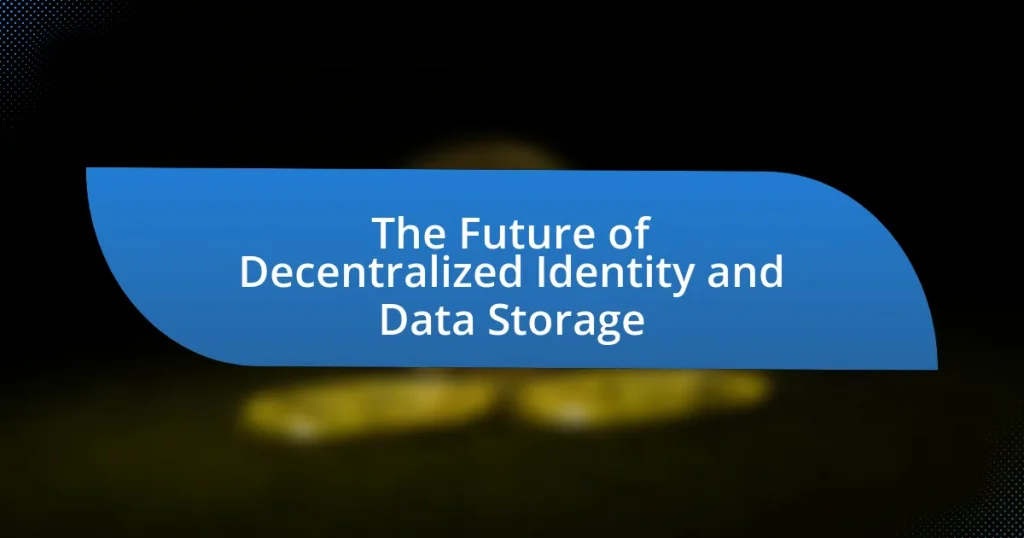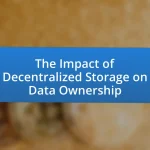Decentralized identity and data storage represent a transformative approach to managing personal information, allowing individuals to control their identities without reliance on central authorities. This article explores the differences between decentralized and traditional identity systems, highlighting key features such as self-sovereignty, privacy, interoperability, and security. It discusses the advantages of decentralized data storage, including enhanced security and user control, while addressing challenges like scalability and regulatory compliance. Additionally, the article examines the economic benefits of decentralized identity, potential new business models, and the future outlook shaped by technological advancements, particularly blockchain and artificial intelligence.
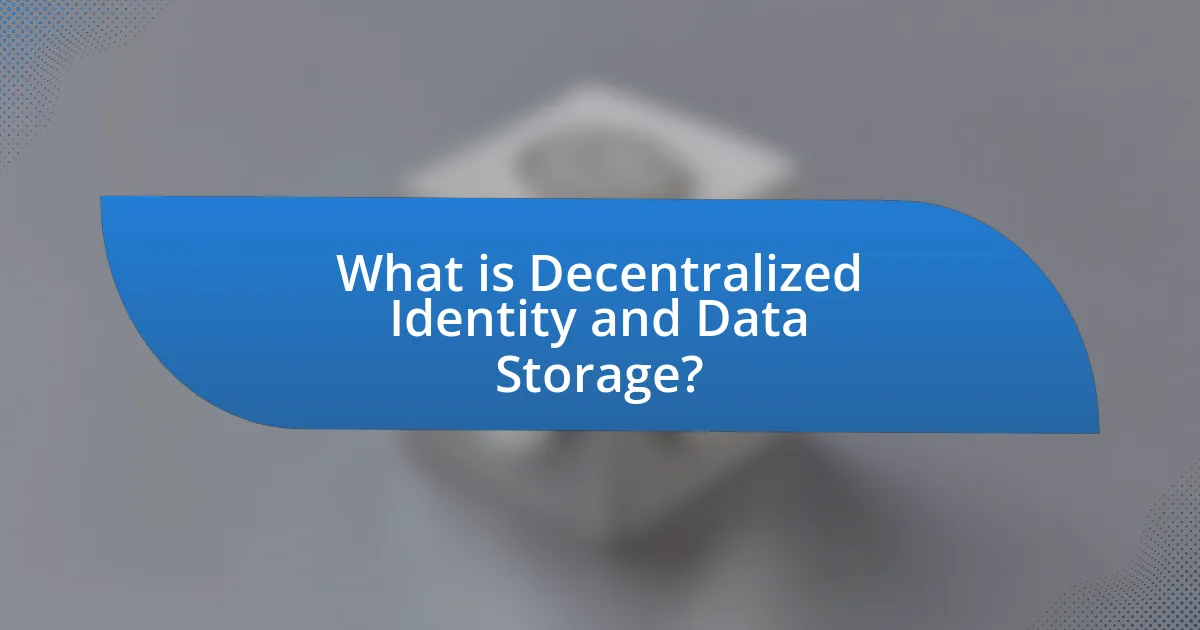
What is Decentralized Identity and Data Storage?
Decentralized identity and data storage refer to systems that allow individuals to control their own identity and personal data without relying on a central authority. This approach utilizes blockchain technology to create secure, verifiable identities that can be managed by users themselves. According to a report by the World Economic Forum, decentralized identity solutions can enhance privacy and security by reducing the risk of data breaches associated with centralized databases.
How does decentralized identity differ from traditional identity systems?
Decentralized identity differs from traditional identity systems primarily in its structure and control. In traditional identity systems, a central authority, such as a government or corporation, manages and verifies identities, leading to potential vulnerabilities and privacy concerns. In contrast, decentralized identity allows individuals to control their own identity data through blockchain or distributed ledger technology, enhancing security and privacy. This shift empowers users by enabling them to share only necessary information without relying on a central entity, thereby reducing the risk of data breaches and identity theft.
What are the key features of decentralized identity?
Decentralized identity features self-sovereignty, privacy, interoperability, and security. Self-sovereignty allows individuals to control their own identity without relying on centralized authorities. Privacy is enhanced as users can selectively share their information, minimizing exposure to data breaches. Interoperability ensures that decentralized identities can be used across various platforms and services, facilitating seamless user experiences. Security is bolstered through cryptographic methods, which protect identity data from unauthorized access and manipulation. These features collectively empower users, reduce reliance on third parties, and enhance trust in digital interactions.
Why is decentralization important for identity management?
Decentralization is important for identity management because it enhances security, privacy, and user control over personal data. By distributing identity data across multiple nodes rather than storing it in a central repository, the risk of data breaches is significantly reduced, as there is no single point of failure. Furthermore, decentralized identity systems empower individuals to manage their own identities without relying on third-party organizations, which can lead to greater privacy and autonomy. For instance, blockchain technology enables secure and verifiable identity transactions, ensuring that users have full control over their information while maintaining transparency and trust.
What role does data storage play in decentralized identity?
Data storage is fundamental to decentralized identity as it enables individuals to control their personal information securely and privately. In decentralized identity systems, data is often stored on distributed networks, allowing users to manage their credentials without relying on a central authority. This approach enhances security by reducing the risk of data breaches associated with centralized databases. For example, blockchain technology is frequently utilized for storing identity data, providing an immutable record that ensures authenticity and integrity. Thus, effective data storage solutions are crucial for empowering users and maintaining the trustworthiness of decentralized identity frameworks.
How is data stored in decentralized systems?
Data in decentralized systems is stored across multiple nodes rather than a single central server. This distribution enhances security and resilience, as each node maintains a copy of the data, making it less vulnerable to attacks or failures. For example, blockchain technology exemplifies this approach, where data is stored in blocks that are linked and secured through cryptographic hashes, ensuring integrity and transparency. Additionally, decentralized storage solutions like IPFS (InterPlanetary File System) utilize a peer-to-peer network to store and retrieve data, allowing users to access files without relying on a central authority. This method of storage not only improves data availability but also empowers users with greater control over their information.
What are the advantages of decentralized data storage over centralized systems?
Decentralized data storage offers enhanced security, improved privacy, and greater resilience compared to centralized systems. In decentralized storage, data is distributed across multiple nodes, reducing the risk of a single point of failure and making it more difficult for unauthorized access or data breaches to occur. For instance, a study by the University of Cambridge found that decentralized systems can significantly lower the likelihood of data loss due to their redundancy and distributed nature. Additionally, users maintain greater control over their data, as they can choose where and how it is stored, which aligns with privacy regulations like GDPR. This control fosters trust and empowers individuals in managing their digital identities.
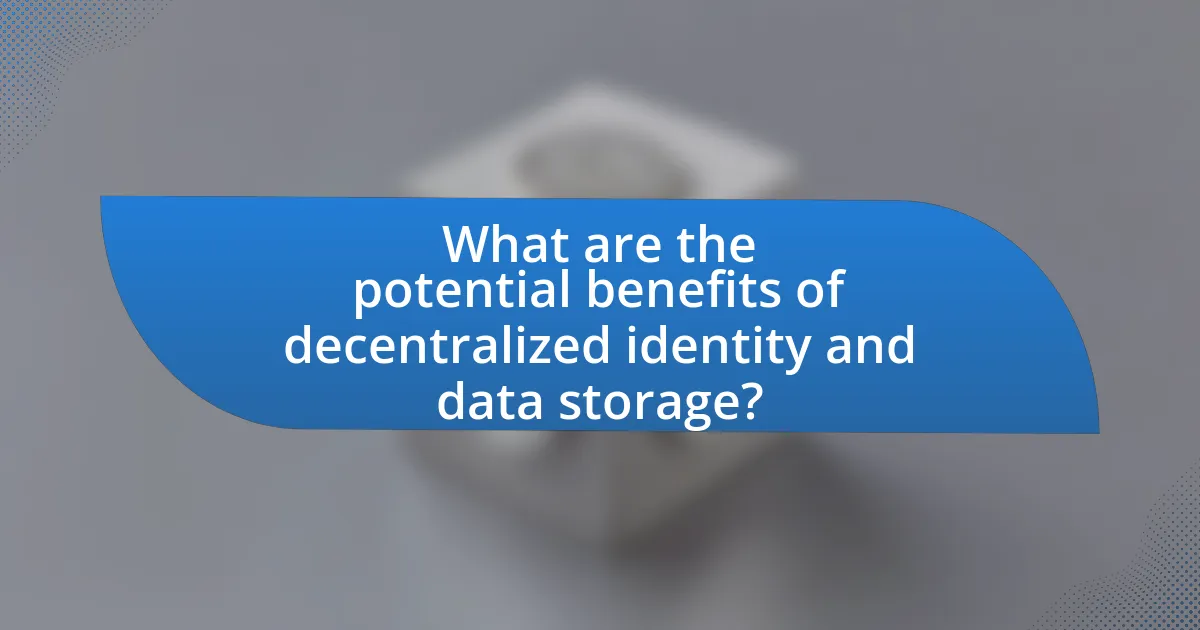
What are the potential benefits of decentralized identity and data storage?
Decentralized identity and data storage offer enhanced security, privacy, and user control over personal information. By eliminating centralized databases, individuals reduce the risk of data breaches, as there is no single point of failure. Furthermore, decentralized systems empower users to manage their identities without relying on third-party intermediaries, which minimizes the potential for misuse of personal data. According to a report by the World Economic Forum, decentralized identity solutions can significantly lower identity fraud rates and improve user trust in digital interactions.
How can decentralized identity enhance user privacy?
Decentralized identity enhances user privacy by allowing individuals to control their personal data without relying on centralized authorities. This control minimizes the risk of data breaches and unauthorized access, as users can selectively share information only when necessary. For instance, decentralized identity systems utilize blockchain technology, which provides a secure and immutable record of identity attributes, ensuring that users maintain ownership of their data. Research indicates that decentralized identity solutions can reduce identity theft incidents by up to 80%, demonstrating their effectiveness in protecting user privacy.
What mechanisms protect user data in decentralized systems?
Decentralized systems protect user data through mechanisms such as encryption, distributed ledger technology, and user-controlled identity management. Encryption ensures that data is stored in a secure format, making it unreadable to unauthorized users. Distributed ledger technology, like blockchain, provides a transparent and tamper-proof record of transactions, enhancing data integrity and security. User-controlled identity management allows individuals to maintain ownership of their personal information, granting them the ability to share or withhold data as they choose. These mechanisms collectively enhance privacy and security, reducing the risk of data breaches and unauthorized access.
How does user control over data improve trust?
User control over data improves trust by empowering individuals to manage their personal information, thereby enhancing transparency and accountability. When users have the ability to decide how their data is collected, shared, and utilized, they feel more secure and confident in the systems they engage with. Research indicates that 81% of consumers feel they have lost control over their personal information, highlighting the importance of user agency in fostering trust. By allowing users to retain ownership and control, organizations can build stronger relationships, as users are more likely to engage with services that respect their privacy and data preferences.
What economic advantages does decentralized identity offer?
Decentralized identity offers significant economic advantages, including reduced costs for identity verification and enhanced security that lowers fraud-related losses. By eliminating intermediaries, organizations can save on fees associated with traditional identity verification processes. For instance, a study by the World Economic Forum estimates that decentralized identity solutions could save businesses up to $100 billion annually by streamlining customer onboarding and reducing identity theft. Additionally, decentralized identity systems empower individuals to control their own data, potentially leading to new revenue streams through data monetization. This shift not only fosters innovation but also enhances consumer trust, which can drive economic growth.
How can businesses reduce costs with decentralized identity solutions?
Businesses can reduce costs with decentralized identity solutions by minimizing the expenses associated with identity verification and data management. Decentralized identity systems eliminate the need for centralized databases, which reduces infrastructure costs and the risk of data breaches. According to a study by the World Economic Forum, implementing decentralized identity can lower identity verification costs by up to 50% due to reduced reliance on third-party services and streamlined processes. Additionally, these solutions enhance operational efficiency by automating identity verification, leading to faster transactions and reduced administrative overhead.
What new business models can emerge from decentralized identity?
Decentralized identity can lead to new business models such as self-sovereign identity services, where individuals control their own identity data, enabling companies to offer personalized services without compromising user privacy. This model allows businesses to reduce costs associated with identity verification processes, as they can rely on verified credentials from users rather than conducting extensive background checks. Additionally, decentralized identity can facilitate trustless transactions in sectors like finance and healthcare, where secure and verifiable identity is crucial. For instance, companies can create platforms that leverage blockchain technology to authenticate users without central authorities, thus enhancing security and reducing fraud. The rise of decentralized identity also opens opportunities for data monetization, where users can choose to share their data with businesses in exchange for compensation, creating a new revenue stream for both parties.
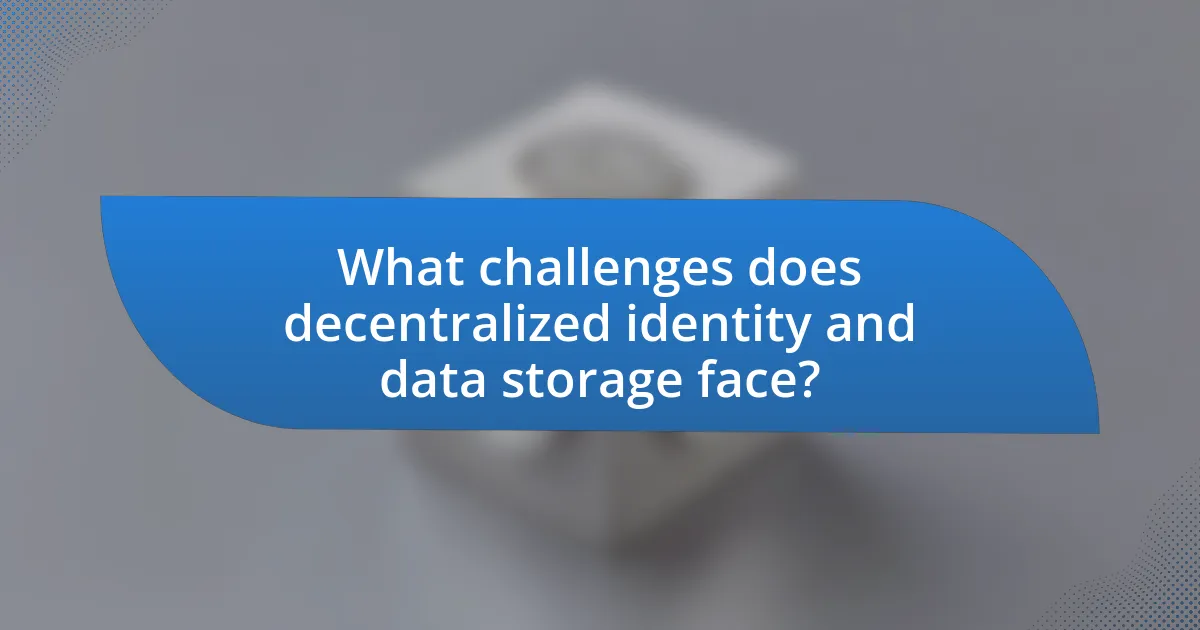
What challenges does decentralized identity and data storage face?
Decentralized identity and data storage face significant challenges, including scalability, interoperability, and security. Scalability issues arise as the number of users increases, making it difficult to maintain performance and efficiency in decentralized networks. Interoperability challenges occur when different systems and platforms cannot communicate effectively, hindering the seamless exchange of identity information. Security concerns are paramount, as decentralized systems can be vulnerable to attacks, and users may struggle with managing their private keys, which are essential for accessing their data. These challenges must be addressed to ensure the successful implementation and adoption of decentralized identity and data storage solutions.
What are the technical hurdles in implementing decentralized identity?
The technical hurdles in implementing decentralized identity include interoperability, scalability, security, and user adoption. Interoperability challenges arise from the need for different decentralized identity systems to communicate effectively, which is essential for widespread use. Scalability issues stem from the requirement to handle a large number of transactions and identities without compromising performance, as seen in blockchain networks that can become congested. Security concerns involve protecting user data from breaches and ensuring that identity verification processes are robust against fraud. Lastly, user adoption is hindered by the complexity of decentralized systems, which can deter individuals and organizations from transitioning from traditional identity management methods. These hurdles must be addressed to realize the full potential of decentralized identity solutions.
How do scalability issues affect decentralized systems?
Scalability issues significantly hinder the performance and usability of decentralized systems. These systems often struggle to handle increased transaction volumes or user growth, leading to slower processing times and higher costs. For instance, Bitcoin’s transaction throughput is limited to approximately seven transactions per second, which becomes problematic as demand rises, causing delays and increased fees. Additionally, scalability challenges can result in network congestion, where nodes become overwhelmed, further exacerbating latency and reducing overall efficiency. This directly impacts user experience and adoption rates, as potential users may be deterred by slow and costly transactions.
What security concerns must be addressed in decentralized identity?
Decentralized identity must address several security concerns, including data privacy, identity theft, and unauthorized access. Data privacy is critical as users need assurance that their personal information is not exposed or misused; for instance, breaches in decentralized systems can lead to the exposure of sensitive data. Identity theft poses a significant risk, as attackers may exploit vulnerabilities in the identity verification process to impersonate individuals. Unauthorized access is another concern, where inadequate security measures can allow malicious actors to gain control over identity credentials. According to a report by the World Economic Forum, 60% of organizations have experienced identity-related breaches, highlighting the urgency of addressing these security issues in decentralized identity frameworks.
What regulatory challenges impact decentralized identity and data storage?
Regulatory challenges impacting decentralized identity and data storage include compliance with data protection laws, such as the General Data Protection Regulation (GDPR) in Europe, which mandates strict guidelines on data handling and user consent. These regulations create obstacles for decentralized systems that prioritize user control over data, as they often require centralized entities to ensure compliance. Additionally, the lack of a clear legal framework for digital identities complicates the implementation of decentralized solutions, leading to uncertainty for developers and users alike. The evolving nature of technology further complicates regulatory responses, as existing laws may not adequately address the unique characteristics of decentralized systems.
How do existing laws affect the adoption of decentralized identity?
Existing laws significantly impact the adoption of decentralized identity by establishing regulatory frameworks that either facilitate or hinder its implementation. For instance, data protection regulations like the General Data Protection Regulation (GDPR) in Europe impose strict requirements on data handling and user consent, which can complicate the deployment of decentralized identity systems that rely on user-controlled data sharing. Additionally, laws regarding identity verification and anti-money laundering (AML) can create barriers, as decentralized identity solutions may not align with traditional identity verification processes mandated by regulators. These legal constraints can slow down innovation and adoption, as organizations must navigate compliance challenges while developing decentralized identity technologies.
What future regulations might shape the landscape of decentralized identity?
Future regulations that might shape the landscape of decentralized identity include data protection laws, identity verification standards, and interoperability requirements. The General Data Protection Regulation (GDPR) in Europe sets a precedent for how personal data should be handled, influencing future regulations globally. Additionally, the emergence of standards from organizations like the World Wide Web Consortium (W3C) for decentralized identifiers (DIDs) could lead to regulatory frameworks that mandate compliance for identity solutions. These regulations will likely focus on user consent, data ownership, and security measures, ensuring that decentralized identity systems protect individual privacy while enabling secure transactions.
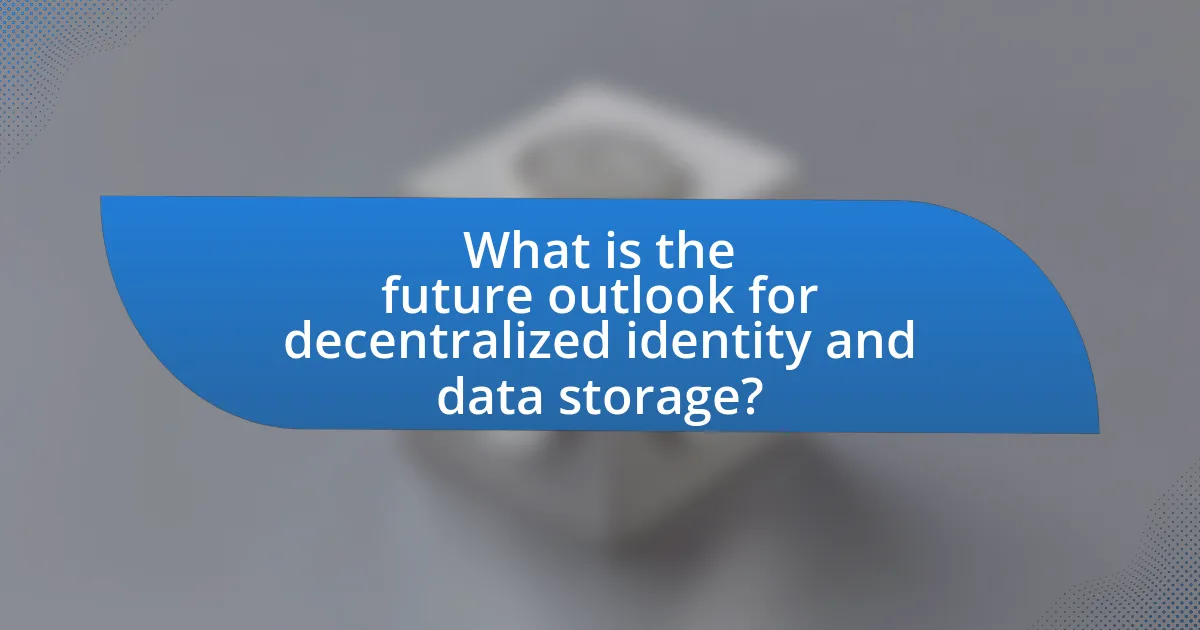
What is the future outlook for decentralized identity and data storage?
The future outlook for decentralized identity and data storage is promising, driven by increasing demand for privacy, security, and user control over personal data. As organizations and individuals seek to mitigate risks associated with centralized data breaches, decentralized systems offer a robust alternative by enabling users to manage their identities without relying on a single point of failure. According to a report by Gartner, by 2025, 30% of organizations will use decentralized identity solutions, reflecting a significant shift towards this model. Furthermore, advancements in blockchain technology and cryptographic methods are enhancing the feasibility and scalability of decentralized identity systems, making them more attractive for widespread adoption.
How will advancements in technology influence decentralized identity?
Advancements in technology will significantly enhance decentralized identity by improving security, interoperability, and user control. Technologies such as blockchain provide a secure framework for identity verification, reducing the risk of data breaches and fraud. For instance, the use of cryptographic techniques ensures that personal information remains private and only accessible to authorized parties. Additionally, advancements in artificial intelligence and machine learning can facilitate the seamless integration of decentralized identity systems across various platforms, allowing users to manage their identities more efficiently. According to a report by the World Economic Forum, by 2025, 1 billion people will have a digital identity, highlighting the growing importance of these technological advancements in shaping the future of identity management.
What role will blockchain play in the future of decentralized identity?
Blockchain will serve as the foundational technology for decentralized identity by providing a secure, immutable, and transparent method for identity verification. This technology enables individuals to control their own identity data without reliance on centralized authorities, reducing the risk of data breaches and identity theft. According to a report by the World Economic Forum, blockchain can enhance privacy and security in identity management by allowing users to share only the necessary information for verification, thus minimizing exposure of personal data. Furthermore, blockchain’s decentralized nature ensures that identity records are not subject to single points of failure, making the system more resilient and trustworthy.
How might artificial intelligence integrate with decentralized identity systems?
Artificial intelligence can integrate with decentralized identity systems by enhancing identity verification processes through machine learning algorithms. These algorithms can analyze vast amounts of data to identify patterns and anomalies, improving the accuracy of identity validation. For instance, AI can facilitate biometric authentication methods, such as facial recognition or fingerprint scanning, which can be securely stored and managed within decentralized frameworks. This integration not only streamlines user experiences but also bolsters security by reducing the risk of identity theft. Furthermore, AI can automate the management of digital identities, ensuring that users maintain control over their personal information while complying with privacy regulations.
What practical steps can organizations take to adopt decentralized identity solutions?
Organizations can adopt decentralized identity solutions by implementing a multi-step approach that includes assessing their current identity management systems, engaging with decentralized identity frameworks, and training staff on new technologies. First, organizations should evaluate their existing identity management processes to identify gaps and areas for improvement. Next, they can collaborate with established decentralized identity frameworks, such as the Decentralized Identity Foundation, to understand best practices and standards. Additionally, organizations should invest in training programs to ensure that employees are knowledgeable about decentralized identity technologies, which can enhance security and user privacy. By following these steps, organizations can effectively transition to decentralized identity solutions, improving their overall data management and security posture.
What best practices should organizations follow when implementing decentralized identity?
Organizations should prioritize user control and privacy when implementing decentralized identity. This involves enabling users to manage their own identity data without relying on a central authority, which enhances security and trust. Additionally, organizations should adopt open standards and protocols, such as W3C’s Decentralized Identifiers (DIDs) and Verifiable Credentials, to ensure interoperability across different systems.
Furthermore, organizations must conduct thorough risk assessments to identify potential vulnerabilities in their decentralized identity systems. Regular audits and updates are essential to maintain security and compliance with regulations like GDPR. Training staff on decentralized identity principles and technologies is also crucial to ensure effective implementation and user support.
These best practices are supported by industry reports indicating that organizations adopting decentralized identity frameworks experience reduced fraud and improved user engagement, highlighting the effectiveness of these strategies in real-world applications.
How can organizations educate users about decentralized identity benefits?
Organizations can educate users about decentralized identity benefits through targeted training programs and informative resources. These initiatives can include workshops, webinars, and online courses that explain the principles of decentralized identity, emphasizing its advantages such as enhanced privacy, user control over personal data, and reduced risk of identity theft. For instance, a study by the World Economic Forum highlights that decentralized identity systems can significantly lower the chances of data breaches, as users manage their own credentials rather than relying on centralized databases. Additionally, organizations can create user-friendly guides and case studies that illustrate real-world applications and success stories, making the concept more relatable and understandable for users.
